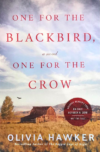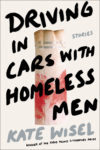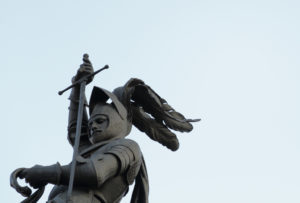(c) 2019 Holding On To Nothing by Elizabeth Chiles Shelburne, reprinted with permission from Blair
Excerpt From Holding on to Nothing
Jeptha Taylor had been in love with Lucy Kilgore since he was sixteen and her smile was the reason why. She had a smile that made people feel safe. Jeptha, particularly. He wasn’t sure why exactly—he just knew a warm, contented feeling stole over him that struck him as exactly the kind of silent bliss a newborn baby feels when his mama feeds him. But when Jeptha pulled his Camaro, dark and shiny as a pond at midnight, into the parking lot behind Judy’s Bar on a hot Friday night in June, he had no idea that Lucy’s smile would be for him tonight, that it would spark through him and spread to her like a hay blaze—fiery, fast, and destructive.
No, as far as Jeptha was concerned, tonight was only about bluegrass and ass, if he could get it. It was his first time at Judy’s Bar, and he felt a bit disloyal for being there. The bar had been open for four months and—being run by a Yankee—had been in disfavor for all those months with the local drinkers. Except for the real drunks, neighbors all, whose loyalty extended only to Jack, Jim, and whatever bar gave them the best shot at driving home shit-faced without getting caught. For those who could afford to be principled in their place of vice, the bar of choice was Avery’s Place, owned by a hometown boy named Avery who had spent ten years fighting the Pentecostals and the Baptists, both Freewill and Southern, for the right to open a bar in what previously had been a dry county. That a Yankee swooped in five years after Avery’s long fight finally ended and made use of the same provisions he had fought so hard to establish was enough for Jeptha, his friends, and the rest of the town to stay well clear of Judy’s Bar. Until, that is, four boys, so far unnamed in the paper even though everyone in town knew who they were, got high behind Avery’s Place one night in early July, lit a small fire in a patch of grass already dried out in the summer’s drought, and ran like hell when it whooshed into a patch of wiring that snaked up the outer wall of the bar. The fire caught hold in the electrical system and sparked its way from wire to wire, finally nesting in a box of receipts that Avery kept under a couple of bottles of 151 proof Everclear, reserved for the worst of the worst drunks. Within minutes, there was only a wall of flame where once there had been a bar, and Avery’s customers ran, taking their principles with them.
Jeptha, not being a subscriber to The Review, the town paper, or really much of a reader generally, heard about the fire two days later from his friend Cody. Jeptha and Cody were bandmates in a Boy Named Sue, a bluegrass group that played Friday nights at Avery’s—Cody sang and played banjo, with Jeptha on mandolin. After a respectful period of silence, in which they thought of the drunken nights—both good and bad—they had enjoyed at Avery’s, Cody explained that Judy had called him two days after the fire (“Typical Yankee. Didn’t even wait for the damn ashes to stop smoking.”) and offered the band a job playing Friday nights at her place. Cody was principled, yes, but a fool? No. He’d accepted and gone on to call his band mates. Jeptha was happy to keep the gig, and all too happy to forget any moral stand he’d once had. He’d agreed to be there on Friday.
And so, Jeptha pulled his mandolin off the passenger seat of his car and made for the front door. He was showered for the first time in two drunken days, and most of the stink had worn off. He wondered if the girl who’d been in his bed last night—Brandy? Brandy Anne? She’d been bendy for sure, that one—would be in the bar and up for another go. Bluegrass and sex wouldn’t be such a bad Friday. He wondered if he’d need to remember her actual name to get her back to his place.
Occupied as his mind was, he hadn’t absorbed the fact of the full parking lot, so when he opened the door—happy to smell the right scent of beer, sweat, and leather that came flooding out—he was shocked to see the place packed to the rafters. He wasn’t sure he’d ever played in front of so many people. A trickle of fear gnawed at his belly. He elbowed his way through the crowd. He gave a quick nod and half smile to the girl from last night. She laughed and looked down at the table, but not before Jeptha saw a blush creep up her cheeks. He smiled to himself, pretty damn sure she’d be up for it again, assuming he could finesse the fact that she was sitting with a girl he’d slept with a few months back and never called again. He gripped his mandolin case and worked his way into line, feeling content. It had the makings of a good night.
Jeptha finally caught the eye of the bartender and owner, Judy. She was in her sixties and, rumor was, had moved down to Tennessee to run this bar with a local man she’d met up in Boston. Jeptha was hard pressed to imagine why someone would move to Boston in the first place, and then, having flown the coop, decide to come back and with a Yankee in tow, no less. Still, here they were. Jeptha couldn’t say that Judy appeared happy about it. Her gray hair, which looked to have never seen the inside of a beauty salon, was pulled into a loose bun from which haphazard chunks escaped, and her t-shirt, wet in spots from the ice she dumped into glasses without so much as an attempt at aim, strained over a set of sagging, ponderous boobs.
She widened her eyes at Jeptha. “Yeah?” she said.
“Hi. How’re you?”
“What do you want?”
“Um, I’ll have a Bud Light, ma’am.” Jeptha shut his mouth. She was clearly a Yankee with no time for formalities.
“A Bud Light and what?”
“Just the beer, ma’am.”
“Don’t call me ma’am.”
“Okay, ma—” Jeptha cut himself off when her lips pursed and her eyes narrowed. “Just a beer, please.”
“You guys are too damn polite for your own good.” She slid the bottle across the bar and nodded at the stage. “You with the band?”
“Yes, ma—” Jeptha stopped. “Yes.”
“If you guys need anything tonight, grab Lucy. She’s helping out with the tables.”
Jeptha turned to see the Lucy she was pointing at with her chin, and the trickle of fear in his belly grew to a flood. There she was—the wavy blond hair tickling her waist where her shirt rode up from bending over to take people’s orders; the pert little nose, turned up at the end in a way that was more cute than beautiful; and her cut-off skirt hugging curves he never got to see in church, back when he used to go. Most of all, there was her smile. Every time he saw it, he fell a little bit more in love.
Jeptha knew Lucy’s smile didn’t mean anything when it was turned to him—birth had given her a nice one and she was polite enough to use it often, but Jeptha had never been able to help the feeling he got the few times she flashed it his way. Even though her smile made others feel safe, she rarely looked as if she felt that way. She instead sported a hunted look, as wary as a deer stopping to nose through a leaf pile for acorns in the fall, the kind of deer that looked so nervous, so ready to bolt, that Jeptha could never bring himself to even sight his rifle on it. Every time, a few seconds after warmth flowed through him at the sight of her smile, he’d see that wariness on her face and realize that he may as well have been standing in the woods without a gun, for all the chance he had of getting her. Especially now. He’d heard from his sister that Lucy was leaving town, moving to Knoxville to work and go to school. At least he wouldn’t have to see her anymore, though his stomach bottomed out at the thought.
Jeptha grabbed his beer off the counter for a much-needed sip of courage. Despite the pulsing needs of the crowd, he could feel Judy’s eyes still on him. Her lips flickered. It looked like her last real smile had occurred sometime in the 1970s, and yet here were her lips, the edges moving up subtly toward her eyes. Jeptha mumbled thanks and walked toward the stage, uncomfortably aware of being watched. He kept his head down, trying to avoid making eye contact with Lucy. If he looked at her, the fear he was feeling would travel out to his hands and make them as useful as an arthritic bird dog.
“Y’all ready?” Cody asked, as Jeptha stepped up on the stage and wedged his beer between two amps.
Cody nodded once and then tapped his foot—one and a two and a here we go—and launched into a riff on his banjo, which Jeptha and the fiddler and the drummer raced to catch up with. His fingers were stiff and stumbling. His stage fright, which usually decreased as he played, grew into an untamable creature, fed by the fear of playing poorly in front of Lucy. He played like he was six years old, holding the mandolin for the first time—his fingers glancing off the strings, missing his intros and staring into the crowd at Lucy during what was supposed to a solo. It was the kind of pitiful performance that makes a pick-up band think they ought to start practicing.
During the fourth song, he watched, mesmerized, as Lucy’s hips snaked this way and that through the crowd toward the band. She had a small tray in her hands, on which rested five shot glasses, full of what looked tantalizingly like whiskey. She waited at the left side of the stage a few feet from Jeptha until the song ended.
“Hey,” she said after they wound the song to a half-hearted close. “It’s Jeptha, right? Deanna’s brother?”
“Unfortunately.”
“You said it, not me,” she said, her eyebrow raised. “Judy told me to bring these over. Said y’all couldn’t sound any worse drunk than you did sober.”
Jeptha winced. “I was hoping y’all couldn’t hear that,” he said, passing out shots to Cody and the other guys. He nodded at the tray. “Who’s that one for?”
“Me, I think.”
“You get to drink on the job?”
“You are.” She wrinkled her nose at him and straightened her shoulders, clearly annoyed. Jeptha felt like a fool. “Besides, Judy said I needed to loosen up, get some better tips.”
“You look to be doing all right to me.”
“If you count slaps on the ass as tips, then yeah, I’m rich as hell. Cheers,” she said and tipped the shot down her throat. In his hurry to keep up with her, a few drops of whiskey went down the wrong pipe, and he coughed so hard tears welled in the corners of his eyes.
Lucy cocked her head at him, a teasing smile on her lips. Jeptha’s insides fizzed with a longing so fierce he felt it in his fingertips. “I’ll tell Judy to make the next one a lemon drop,” she said.
“Hey, that ain’t nice,” he said to her, but in his head he was thinking, Do it again. Please, God, do it again.
All trace of teasing dropped off Lucy’s face, and she nodded seriously. “You’ll be great. I heard you play at church back when.”
“You did?”
“Yep. Besides, if you get nervous, imagine all these people naked. Not me, though. I want no part of that, thank you.”
It was the longest conversation Jeptha had ever had with Lucy. She walked away as Jeptha tried and failed to keep his mind off the much-nourished fantasy of her naked. Finally, he shook his head and tore his gaze away. He nodded thanks to Judy, who mouthed, “For what?” followed by the tiniest, coolest of smiles. He relaxed under the influence of the whiskey and the image of a naked Delnor Gilliam tapping his foot against the floor, his gray, straggly beard bouncing off his belly in time to the music. He nodded at Cody, ready to play again.
**
Elizabeth Chiles Shelburne grew up reading, writing, and shooting in East Tennessee. After graduating from Amherst College, she became a writer and a staff editor at the Atlantic Monthly. Her nonfiction work has been published in The Atlantic Monthly, Boston Globe, and Globalpost, among others. She worked on this novel in Grub Street’s year-long Novel Incubator course, under Michelle Hoover and Lisa Borders. Her essay on how killing a deer made her a feminist was published in Click! When We Knew We Were Feminists (edited by Courtney E. Martin and J. Courtney Sullivan.) Holding On To Nothing is her debut novel. Find her on Twitter @ecshelburne.







